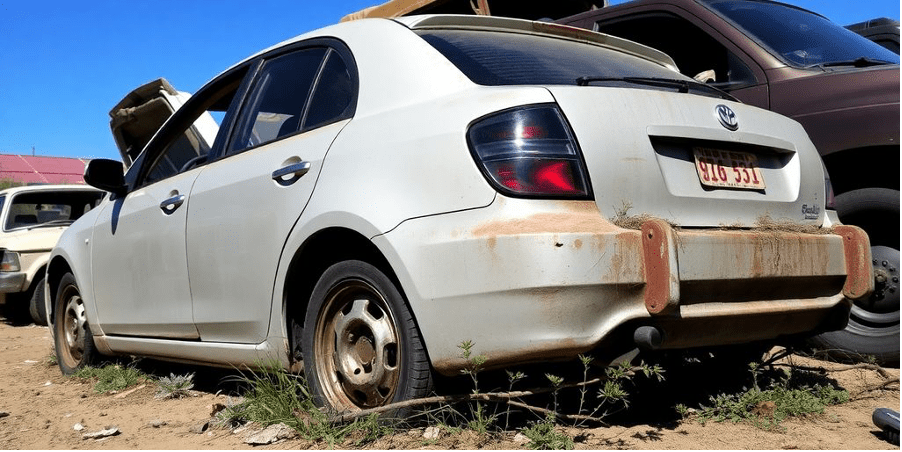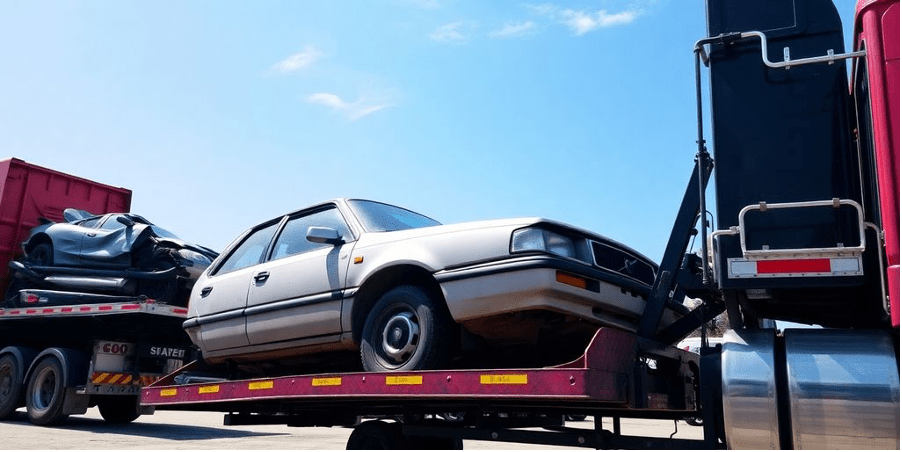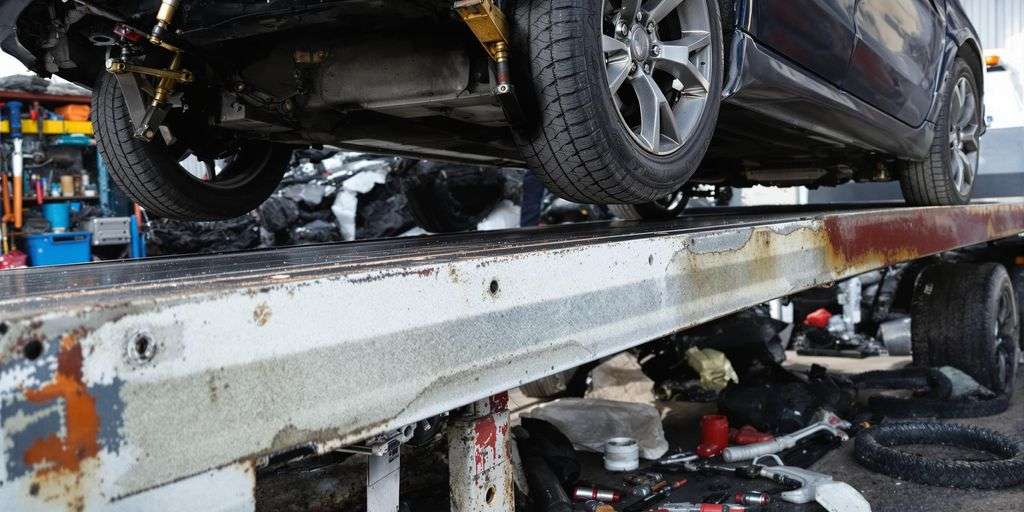Key Takeaways
- Make sure you have all necessary documents like the car's title and a bill of sale ready before approaching a junkyard.
- Clean out your car completely, removing personal items and checking for any valuables before handing it over.
- Research and contact multiple junkyards to compare offers and choose the best deal for your car.
- Understand the factors that influence your car's value at a junkyard, such as condition and demand for parts.
- Notify the DMV of the sale to avoid any future liabilities and cancel your insurance once the sale is complete.
Understanding the Process of Transferring Car Ownership to a Junkyard
Legal Requirements and Documentation
Transferring a car to a junkyard isn't just about handing over the keys and walking away. It's important to understand the legal steps involved. First, you'll need to gather all the necessary documents. This often includes the car's title, which proves ownership, and sometimes a release of liability form. This form is crucial because it tells the Department of Motor Vehicles (DMV) that the car is no longer yours, so if it gets into any trouble, you're off the hook. Check with your local DMV to know exactly what paperwork is required in your state, as it can vary.
Importance of a Bill of Sale
A bill of sale is more than just a piece of paper; it's your proof that the transaction happened. It should list the date of the sale, the agreed-upon price, and the details of both the buyer (the junkyard) and the seller (you). Having this document can protect you if any disputes arise later. Some states even require it for the DMV to process the ownership transfer, so don't skip this step.
Notifying the DMV
Once you've got all your documents in order, the next step is to notify the DMV. This is a critical move to ensure the car is officially out of your name. You might need to fill out a notice of transfer form, which can usually be done online or in person. This step not only keeps your records clean but also prevents any future liabilities related to the car. After completing these steps, you can rest easy knowing the car is no longer your responsibility.
Preparing Your Car for the Junkyard

Cleaning and Removing Personal Items
Before you send your car off to the junkyard, you'll want to make sure it's clean. Not that the junkyard folks care about a little dirt, but it's more about ensuring you've got everything you need out of there. Double-check all the nooks and crannies—the glove box, under the seats, and the trunk. You'd be surprised at what can hide in those spots. Don't forget to take out personal touches like keychains or bumper stickers. If you've got custom rims or aftermarket parts, consider removing them. They might fetch a better price sold separately.
Gathering Necessary Paperwork
Next up, make sure you've gathered all the necessary documents. This includes the car's title, registration, and any maintenance records. Having your paperwork in order can really smooth out the process when you hand over the car.
Here's a quick checklist:
- Car Title
- Registration
- Maintenance Records
These documents not only help in transferring ownership but also give the junkyard confidence that the car is yours to sell.
Assessing Vehicle Condition
Even though your car's headed to the junkyard, it's good to know its condition. This helps you understand what you might get for it. Check if it's still drivable or if there are any parts in decent shape. A car that's still running or has valuable parts can sometimes get you a better price. Jot down any details about the car's condition—like if the engine's shot or the tires are bald. This info can be handy when discussing with the junkyard.
Choosing the Right Junkyard for Your Car
Researching Local Junkyards
When you're ready to part with your old car, finding the right junkyard is the first step. Start by searching online for local junkyards or auto salvage yards. You can type in phrases like “buy junk cars” or “auto salvage yards near me.” This search will give you a list of potential places. Don't forget to ask friends or family who might have experience with junkyards. They can provide personal recommendations that you can trust.
Reading Reviews and Checking Credentials
Once you have a list of potential junkyards, it's time to dig a little deeper. Look for online reviews and testimonials about these places. These reviews can give you a sense of the junkyard's reputation. Make sure the junkyard is licensed and follows local regulations. A reputable junkyard will have no problem showing you their credentials.
Contacting Junkyards for Quotes
After narrowing down your list, reach out to these junkyards to ask about their services and pricing. It's a good idea to call multiple junkyards to see who offers the best deal. When you contact them, have details about your car ready, like the make, model, and any damage it has. This information helps them give you a more accurate quote. Remember, clear communication is key to ensuring you're well-informed before making any decisions.
Negotiating the Best Price for Your Junk Car
Factors Affecting Junk Car Value
When you're trying to get the most cash for your junk car, there are a few things to keep in mind. The car's condition is a biggie. A vehicle with minimal damage will fetch a higher price than one that's been through the wringer. Other factors include the make, model, and year. Some cars are just worth more, even as scrap. The weight of your car also matters since heavier cars contain more metal, which is valuable. Don't forget about location, too. Prices can vary based on local demand for certain parts.
Tips for Effective Negotiation
Before you start haggling, do your homework. Gather quotes from several junkyards to get a sense of what your car might be worth. This way, you can maximize cash for a junk car by knowing your vehicle's true value. When you talk to junkyards, be upfront about the car's condition, but don't undersell it. Highlight any parts that are still in good shape or any recent repairs. Remember, it's okay to negotiate. Even if a junkyard's offer seems low, you might be able to bump it up a bit by pointing out the car's strengths.
Understanding the Offer
When you get offers from junkyards, it's important to understand what they include. Some offers might seem high, but they could come with hidden fees, like towing charges. Ask if the price includes free towing, especially if your car isn't drivable. Check if the offer is contingent on anything, like the car's condition upon arrival or the inclusion of certain parts. Make sure you know exactly what you're agreeing to before you finalize anything. A clear understanding of the offer ensures you won't be hit with unexpected costs later on.
Selling your junk car isn't just about getting rid of an old vehicle. It's about finding the right buyer who sees the value in what you have. With a bit of preparation and negotiation, you can turn that clunker into some extra cash.
Arranging Transportation to the Junkyard
Towing Options and Costs
When it's time to say goodbye to your old car, figuring out how to get it to the junkyard is key. Towing is the most common method, especially for cars that aren't running. Many junkyards offer towing services, which can be convenient but might come with a fee. Check if the junkyard includes towing in their offer or if it's an extra cost. You can also hire a towing company independently, which might be cheaper, or even use a tow dolly if you have access to one.
Scheduling a Pickup
Once you've settled on a junkyard, it's time to schedule a pickup. This involves setting a date and time that works for both you and the junkyard. Make sure all your paperwork is ready before they arrive, including the title and any necessary forms. It's a good idea to confirm the pickup details a day in advance to avoid any last-minute hiccups.
Driving the Car Yourself
If your car is still drivable, you might opt to drive it to the junkyard. This can save you the cost of towing and gives you a bit more control over the process. Before you hit the road, double-check the car's condition to ensure it's safe to drive. Inform the junkyard of your arrival time so they can be prepared to process your vehicle promptly. Remember, once you hand over the keys, your responsibility for the car ends, making it a straightforward option if feasible.
Finalizing the Sale with the Junkyard
Completing the Necessary Paperwork
First things first, you gotta get all your paperwork in order. This means having your car’s title ready and any other documents the junkyard might ask for. Double-check everything to make sure it's all correct. Missing a single detail can mess up the whole process. It's also wise to prepare a bill of sale. This document should list the sale date, the amount paid, and details about both you and the junkyard. Some places might even ask for a release of liability to let the DMV know you’re no longer responsible for the car.
Handing Over the Keys and Documents
When the junkyard folks come to pick up your car, you’ll need to hand over the keys. Don’t forget any extras like spare keys or the owner's manual. Make sure the car is accessible for pickup. If the junkyard is sending a tow truck, ensure there’s nothing in the way so they can load it up easily. If you're driving it there yourself, just follow their instructions for a smooth drop-off.
Receiving Payment and Confirmation
After everything is checked out, you’ll get paid. This might be in cash or a check, depending on what the junkyard prefers. Always get a receipt or some proof of the transaction. This is crucial for your records and to avoid any future hassles. Check that the payment amount matches what you agreed on. If anything feels off, speak up and sort it out before the car leaves your sight.
Selling your car to a junkyard can be a straightforward process if you’ve got everything lined up. Just remember to cross your t’s and dot your i’s when it comes to paperwork and communication.
Post-Sale Responsibilities and Considerations

Reporting the Sale to Authorities
Once you've parted ways with your old car, one of the first things to tackle is reporting the sale to your local DMV or relevant authorities. This step isn't just about following the rules—it's about protecting yourself too. If the car gets into any trouble after it's left your hands, you want to be sure you're not on the hook. Some places have deadlines for this kind of thing, so don't drag your feet. Check out your state's specific requirements to avoid any hiccups.
Canceling Insurance and Registration
Now that the car's out of your life, it’s time to take care of the paperwork on your end. Canceling your car insurance and registration is a must. No need to pay for something you don't own anymore, right? Give your insurance company a call to cancel the policy and maybe even snag a refund for any unused months. And don't forget about the registration—head over to your local DMV or hop online to get that sorted. It's one less thing to worry about.
Environmental Considerations
Selling your car to a junkyard isn't just about clearing space in your driveway. It's also about doing your bit for the planet. Junkyards usually dismantle vehicles, salvaging parts and recycling materials. This helps reduce waste and supports environmental conservation. So, while you might be saying goodbye to your old ride, you're also contributing to a greener world. Not a bad trade-off, right?
When selling a junk vehicle, it's essential to complete the necessary paperwork to prove ownership transfer to the buyer. This includes documentation for cars, buses, trucks, or SUVs to ensure a smooth transaction.
Wrapping It Up: Your Car's Final Journey
So, there you have it. Getting your car to a junkyard might seem like a big task, but once you break it down, it's pretty straightforward. You've got to gather your paperwork, clean out your stuff, and maybe even haggle a bit. Whether you drive it there yourself or have it towed, the key is to be prepared and know what you're getting into. And hey, it's not just about getting rid of an old car; it's about doing it in a way that's easy on you and the environment. Plus, you might even pocket some cash in the process. So, take a deep breath, follow the steps, and soon enough, you'll have one less thing to worry about.
Frequently Asked Questions
What documents do I need to transfer car ownership to a junkyard?
You'll need the car's title, a bill of sale, and possibly a release of liability form. Check with your local DMV for specific requirements.
How can I find a trustworthy junkyard?
Research local junkyards, read online reviews, and check their credentials to ensure they are reputable and licensed.
What should I remove from my car before sending it to the junkyard?
Take out all personal items, including anything in the glove compartment, under the seats, and in the trunk. Also, remove any custom parts you wish to keep.
How do I get my car to the junkyard?
You can either drive it there if it's still running or arrange for towing. Many junkyards offer free towing services.
How is the price for my junk car determined?
The price depends on factors like the car's make, model, age, condition, and demand for its parts. Be ready to negotiate.
Do I need to inform the DMV after selling my car to a junkyard?
Yes, you should notify the DMV to officially transfer ownership and avoid any future liabilities.



